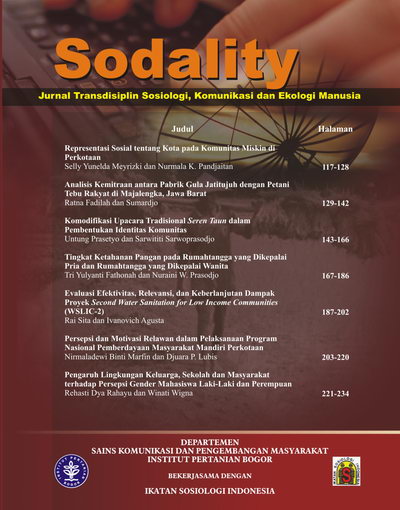Evaluation of Efectivity, Relevancy, And Sustainability on Project Second Water Sanitation For Low Income Communities (WSLIC-2)
Abstract
The aim of this research are to evaluate how far the Second Water Sanitation for Low Income Communities (WSLIC-2) project appropriate with empowerment concept and to evaluate effectiveness, relevance, and sustainability impact of WSLIC-2 project which implemented in Pangradin village. Empowerment concept that used to analyze WSLIC-2 project design and its implementation in field are 10 principles Community Driven Development (CDD). As a project which based on community, WSLIC-2 project design has appropriated with 10 principles of CDD. The principles of CDD which related to concept of plan and construction phase has implemented well in the field. But, the principle who related with concept of maintenances phase not yet implemented well in field. In general, WSLIC-2 project that conducted in Pangradin village assessed quite relevance, but not fully effective and the sustainability is still questionable. Optimization activity of CLTS and strengthening structure of UPS are implementable in order to create a sustainable WSLIC-2 project.
Published
2011-08-13
How to Cite
SitaR., & AgustaI. (2011). Evaluation of Efectivity, Relevancy, And Sustainability on Project Second Water Sanitation For Low Income Communities (WSLIC-2). Sodality: Jurnal Sosiologi Pedesaan, 5(2). https://doi.org/10.22500/sodality.v5i2.5821
Section
Articles
Authors who publish with this journal agree to the following terms:
- Authors retain copyright and grant the journal right of first publication with the work simultaneously licensed under a

This work is licensed under a Creative Commons Attribution 4.0 International License. that allows others to share the work with an acknowledgement of the work's authorship and initial publication in this journal. - Authors are able to enter into separate, additional contractual arrangements for the non-exclusive distribution of the journal's published version of the work (e.g., post it to an institutional repository or publish it in a book), with an acknowledgement of its initial publication in this journal.
- Authors are permitted and encouraged to post their work online (e.g., in institutional repositories or on their website) prior to and during the submission process, as it can lead to productive exchanges, as well as earlier and greater citation of published work (See The Effect of Open Access).





.png)









